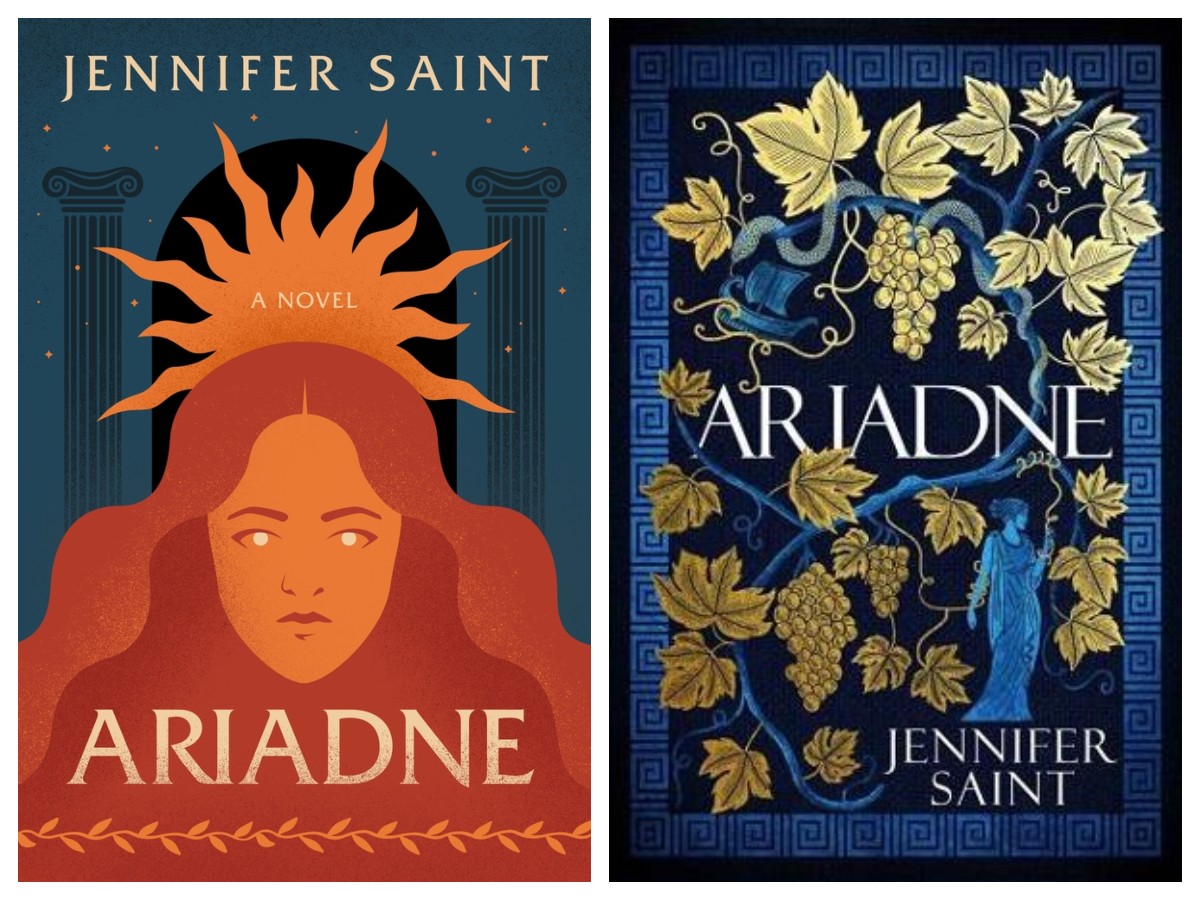I have a weak spot for mythology. You might call it my Achilles heel, ahem. Greek, Norse, Irish, oh bring me gods and fairies of all shapes and levels of malevolence. It is why the Thor movies, all of the Thor movies, remain in my top five of the MCU lineup. Yes, I really mean all the Thor movies, dark elves and all. I love a good retelling of an old tale, a reworking of a legend, or even just a simple re-hash of all the other things that have come before. Stephen Fry has taken pride of place of late as my preferred storyteller of Greek mythology, though my kids and I have been listening to the Greeking Out podcast by National Geographic and eagerly await a second season.
So I could think of no better way to spend Mother’s Day than curled up outside, watching my children play, and reading Ariadne by Jennifer Saint, which was released just this past week. Set on the shores of Crete, Naxos, and Athens, here is a telling of Ariadne with a female gaze. Plunging the reader immediately into the heart of Greek mythology, Saint alternates between the perspective of the two Cretian princesses. We hear of Minos, of the Minotaur, of Theseus, of Daedalus, of course, but the primary concern is where these men intersect with the women, and not vice versa. This is not a retelling of the story of Theseus, this is the story of Ariadne, with a brief appearance by Theseus. The unheard voices of Ariadne and Phaedra tell what it was like to see Theseus for the first time, and for the last. But there is so much more to both of their stories than the thoughts they cast in his direction. While many retellings focus on the betrayal of Minos by his daughter Ariadne, or on the act of Theseus saving the Athenians, here we linger on Naxos with the abandoned princess. We walk along the rocky paths contemplating death and forgiveness with a woman who gave up everything she knew and loved for everything she did not know. Imagine if Elena Ferrante’s Days of Abandonment was set in ancient Greece.
Almost as an inside joke on the focus of Ariadne itself, early on in the story the maid of the princesses tells them the story of Medusa, but from Medusa’s perspective. They had only ever heard of the brave Perseus before, and you can feel their perspective shattering as you read.
My tears had stilled now and I listened intently. I only knew Medusa as a monster. I had not thought she had ever been anything else. The stories of Perseus did not allow for a Medusa with a story of her own… “Why did you tell us that story, Eirene, instead of one of the usual ones?” She stroked my hair but her eyes were fixed on a distant point. “I thought it was time that you knew something different,” she answered.
Throughout the tales of the two sisters, we are consistently reminded that mankind is nothing but the pawns of the gods. With a female perspective, we spend more time around the notion that women are the pawns of gods and men alike. As we travel from Crete to Naxos, from Crete to Athens, from Athens to Naxos, we learn of the strength of women in the face of vain men and petty gods. When I was done with the journey of Ariadne, I realized how little a self-professing mythology junkie like myself had paid attention to some of these women. Despite a desire to always see things from an alternate perspective, to find the maligned woman in the narrative, I still find myself slipping into the so-called traditional view of these stories. With so many tellings of Greek mythology we are given such glorious and gloriously flawed representations of man, that it is easy to take up the mindset that the gods are the only controlling, petulant beings. Men, however, can be far worse. Saint’s descriptions of the wonderful, amazing Hercules make you pause and question everything you ever thought you knew:
No brawny Hercules had lounged on couches in the Amazonian halls bragging of vanquishing and murdering and searing his name across history.
It’s hard to sing along with Disney’s “Go the Distance” after this.
What happens to the side of the “hero,” when the monster is defeated and the woman claimed is abandoned? What happens when a woman falls in love, but not with her husband? Saint adds flesh and bone to the Cretian princesses that are so often left to the footnotes, bringing the reader along into the uneasy “what comes next” after the failure of the happily-ever-after. Ariadne’s early days on Naxos, her encounter with the god Dionysus, her marriage, her elevation, and her final downfall. No spoilers here—all Greek myths end with a downfall.
Saint explores the bonds of motherhood with three very different mothers and the ties of sisters that bind and unbind so easily in this tale. Her depiction of postpartum depression in all three women, showing clearly how differently it affects every woman, is simply stunning. I read Phaedra’s words remembering the lump of stone that would form in my gut as night approached in the early days of my own undiagnosed PPD.
I developed a grim kind of capability. He cried and I nursed him. I paced the floors with him and I even sang to him. When it did not work, the fury would build in my throat; night after night, I swallowed it back down again and persevered. I hoped that if I carried on as though I were a normal mother, eventually it would become true.
So I find myself wanting more from Saint and more from these familiar stories. The refrain of the maid Eirene will ring through my soul each time I now read a familiar tale:
I thought it was time that you knew something different
Mother’s Day always affords me some leisure time. My partner likes to take the brunt of the “Can I have,” “I need,” “Mom! Mom! Mom!” of this particular day, and in the last few years I have used the time to catch up on some reading. This year I just could not put Ariadne down, and I was done reading within 24 hours, wanting to start the whole thing over. The ending of the story, an ending that I had so dreaded, was so poetic and tragic, all at once so beautiful and so horrendous.
Actually, what I was left wanting was a retelling of all the old Grecian tales from the perspective of their maligned women. Next on my reading list, Circe by Madeline Miller, perhaps, or The Silence of the Girls by Pat Barker. If Saint could also work with Shondaland on the TV show of Ariadne, well I would be in Olympus itself.
GeekMom received an early copy of Ariadne for review purposes.




